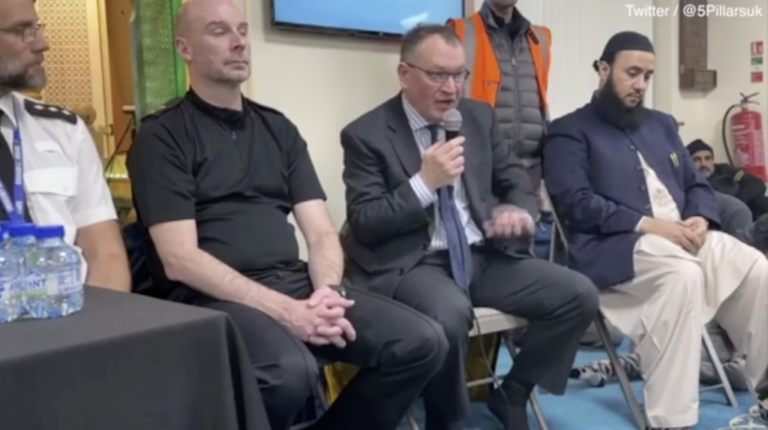As widely reported, the FSU has written to West Yorkshire Police, urging them to delete the ‘non-crime hate incidents’ (or NCHIs) from the records of four pupils at a school in Wakefield who were suspended over minor, accidental damage caused to a copy of the Quran (Epoch Times, Epoch Times, Mail, Mail, Times).
The schoolchildren were suspended from Kettlethorpe High School last week after a student (who happens to be autistic) reportedly brought a copy of the Quran into school “on a dare” having lost a game of Call of Duty with his mates. He and his friends read aloud from it out on the school’s tennis courts, then walked back inside the school, where another pupil knocked it out of their hands and on to the floor. Apparently, it sustained a small tear and a smudged page.
For this, the four students were suspended, and the police were called in. At a meeting with irate ‘community leaders’ at a local Mosque, Chief Inspector Andy Thornton – who is leading the investigation into this dreadful crime – said the students’ treatment of the book has been recorded as an NCHI. As our Deputy Case Director, Ben Jones, remarked on TalkTV, it’s the sort of scenario that if you’d predicted it 20 years ago, you’d immediately have been denounced as an Islamophobic bigot.
In my letter to Inspector Thornton, I asked for assurance that the boys at the centre of the story have not had NCHIs recorded against their names and, if they have, to remove them immediately.
Last July, the professional body for the police in England and Wales, the College of Policing (CoP), issued new interim guidance on the recording of NCHIs following the judgement in the case of Miller v The College of Policing [2021] EWCA Civ 1926. According to the CoP: “Not all incidents reported need to be recorded. A record should only be made where it meets the threshold” set out in the National Standard for Incident Recording Counting Rules (NSIR). Those rules define a ‘hate incident’ as: “Any incident, which may or may not constitute a criminal offence, which is perceived by the victim or any other person as being motivated by prejudice or hate.”
Given that the school has said there was no “malicious intent” on the part of the four children involved (BBC), the recording of a non-crime hate incident is prima facie inconsistent with the definition contained in the NSIR, as there was no motivation of prejudice or hate (although it will now be perceived as such following the recording of it as a ‘hate incident’). What’s perhaps most troubling about this is that unlike actual crimes, NCHIs recorded against children’s names remain on their records when they reach adulthood.
As an organisation, the FSU is hard pressed to imagine a sequence of events more likely to chill public debate and freedom of expression than recording this episode as a ‘hate incident’ and attaching that data to the children’s records, in spite of the absence of any malicious intent.
Last week, a source close to the Home Secretary, Suella Braverman, told the Times: “These are very concerning reports. The Home Secretary is clear that the police response should always be proportionate and consider the welfare of young children as a priority over any perceived insults.”
It’s encouraging to hear Ms Braverman refer to the need for ‘proportionality’, not least because she now has the option to issue a statutory Code of Practice on the recording of NCHIs that will supersede the CoP’s interim guidance – and the Telegraph confirmed yesterday evening that she intends to exercise that option later this month. That she has the power to do this is thanks in no small part to the FSU’s Parliamentary work.
Last year, we worked with Lord Moylan and other peers on an amendment to the Police, Crime, Courts and Sentencing Bill that would have put an end to the practice of recording NCHIs in such a way that they can show up in an enhanced criminal record check. However, that amendment was withdrawn when the Government agreed to make its own amendment granting the Home Secretary the option to produce statutory guidance on the recording and retention of personal data relating to NCHIs. Following the passing of that Bill, the Home Office said the Secretary of State would at some point go ahead and issue this guidance.
No doubt hoping to get out in front of the Home Secretary and demonstrate that no further governmental intervention would be necessary, the CoP then rushed out its own, interim guidance on the recording of NCHIs which was an improvement on the previous iteration.
But with constabulary in West Yorkshire – as well as South Wales, Hampshire and Sussex – so openly flouting the CoP’s guidance, the FSU is delighted that the Home Secretary is now going to issue the new Code of Practice.
You can read my letter to West Yorkshire Police in full here.
If you’d like to know more, the FSU’s detailed briefing on NCHIs can be accessed here. Or alternatively, for a quick, five-minute read on the topic, our FAQs on NCHIs is here.




